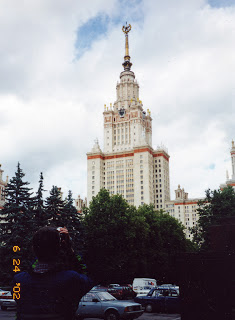We had another opportunity to venture behind the former Iron Curtain in June, 2002, after Bridget and Jeremy moved to Moscow, Russia, and provided a reason for the trip and a home base with tour guides. This time, we traveled right into the very heart of the beast, of the former Soviet Union itself.
Things looked exotic right off the bat after landing at Sheremetyevo Airport and seeing the words on signs in the Cyrillic alphabet. We had immediate exposure to the former Communist influence in the terminal, with the horrid building architecture and the surly employees. In the neighborhoods we noticed a rather scruffy appearance, with weeds growing and unkempt public spaces.
Bridget cautioned us to be careful what we said in public, as well as in their apartment, which they were confident was bugged. (You can read more about that in Bridget's blog
here.) It was forbidden to take photographs of some things, such as any underground metro station, which was a shame because they were so ornate and fascinating. On our last day I did venture taking some video shots of one station while coming down the escalator, and a stern lady scolded me for doing so--I just played the dumb tourist.
The first day we went to the city center and toured Red Square. This was the very spot where former Soviet leaders would view military parades, showing off their might to the West. Here was the Kremlin, Lenin's tomb, St. Basil's Church--all so incredibly exotic to me, as one who grew up during and was so influenced by the Cold War.
Red Square and the Kremlin

St. Basil's Church on Red Square.

From many vantage points we could see the seven sisters of Stalin across the landscape of the city. These are prominent buildings constructed from 1947 to 1953 and are symbolic of Stalin architecture. Here is one of those buildings, Moscow University.

The onion dome churches were another dominant feature. Amazing that these Russian Orthodox churches, as well as the faith of many in the population, survived so many decades of Communist repression. The famous Moscow Cathedral was demolished by the Communists in 1931, with plans to build a grand Palace of the Soviets, which never happened. The world's largest open air swimming pool was constructed in the perpetually flooded ruins in the 1950's.
We took an overnight train to St. Petersburg (formerly known as Leningrad under the Soviets), spent the full day sightseeing there, and took an overnight train back to Moscow. European influences were prominent in St. Petersburg, a beautiful city and the former capital and home of the Czars.
Cathedral of the Resurrection of Christ in St. Petersburg.

One day Suzanne and I ventured an unguided trip to Sergiev Posad, perhaps 50 miles northeast of Moscow. We navigated the Moscow subway system and found a bus destined to go there. It was a warm, sunny day and we were so thirsty. I purchased a bottle of "Seven-ya" soda pop for the bus ride. It was the most awful tasting imitation of lemon lime soda imaginable. Tasted more like bathroom cleaner, and, as thirsty as we were, we drank very little of it. We were proud of ourselves for pulling off this successful adventure.
Domes of numerous ancient churches in Sergiev Posad.

You can't help but notice the impact Word War II had on Russia. It is estimated 20 million Russians died in the conflict. Coming into the city from the airport there are markers showing the maximum advance of the German army. Many cities are designated as "hero cities", such as Moscow, Leningrad, Stalingrad, and many others, due to their defense and suffering during the conflict. There is a prominent museum commemorating the "Great Patriotic War", as they call it. I don't think we Americans can fathom what it was like for them. We visited the museum and it made a strong impression on us.

We visited a most unique cemetery in Moscow, where most of the famous Russians are buried. There was a wide variety of styles of monuments on the graves. Nikita Krushchev's marker was black and white, signifying he had good and bad traits. It is noteworthy that he was buried here, rather than the Kremlin, showing he was out of favor at his death.

Western culture is taking some hold in Russia. McDonald's has several restaurants in Moscow, and it is considered upscale to the Russians. It is novel indeed to get service with a smile. We took a special bus to Ikea to enjoy a salmon dinner.

Oh, there is so much more I'd like to share about this memorable trip. But, another time and another post.
















